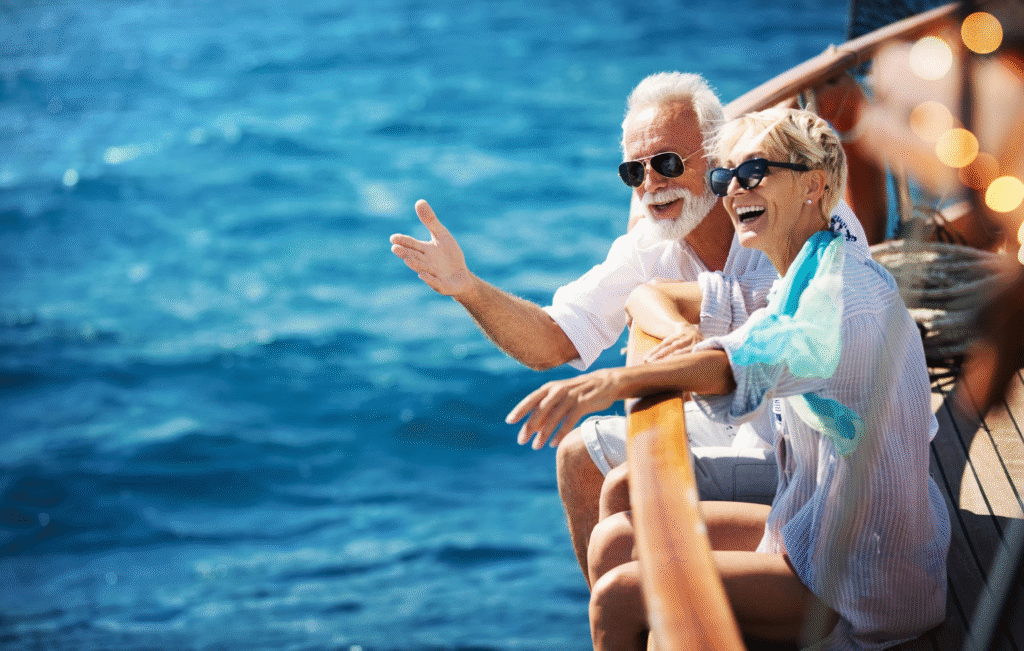Discover why ultra-wealthy Americans are moving away from collecting luxury possessions and focusing instead on once-in-a-lifetime experiences. Explore the psychology, data, and real-life examples shaping this powerful trend in 2025 — and how luxury brands and advisors can adapt to it.
More ultra-wealthy Americans are trading luxury goods for transformative experiences — from private-island retreats to high-impact philanthropy expeditions. This shift reflects a growing desire for meaning, connection, and time freedom rather than ownership. Here’s a deep dive into what’s driving this lifestyle evolution and how it’s redefining the very concept of wealth in America.
1. What Does “Experiences Over Possessions” Actually Mean for the Ultra-Wealthy?
For generations, luxury has been synonymous with ownership — sprawling mansions, supercars, rare art, and haute couture collections. Yet today, an emerging class of America’s ultra-wealthy is redefining status and satisfaction. They are trading tangible possessions for memorable, exclusive, and emotionally charged experiences that deliver deeper value.
In Simpler Terms
Rather than accumulating items that depreciate or require maintenance, the modern elite are investing in moments that expand their identity, elevate their relationships, and enhance their story. These experiences often include:
- Private-island residencies and remote wellness retreats
- Exclusive access events, galas, or performances
- Immersive travel tied to culture, adventure, or conservation
- High-impact philanthropic experiences (e.g., funding a coral reef dive or education mission)
- Private art or culinary collaborations with renowned creators

The asset in this context isn’t what you own — it’s the memory, transformation, and narrative you carry forward. For those who already have everything, experiences offer something more elusive: emotional resonance and social meaning.
2. Why Are the Ultra-Wealthy Making This Shift?
1 Research Proves the “Experience Premium”
A landmark study from the University of Texas at Austin found that people who spend on experiences report higher, longer-lasting happiness than those who buy material goods — even when both cost the same.
This pattern intensifies with wealth. Once basic comforts are secured, the marginal joy from more possessions drops significantly. A similar Harvard Business School paper confirmed that the way individuals spend money — not how much they have — predicts happiness more accurately.
2 Identity, Legacy, and Storytelling
Owning something luxurious — say, a $500,000 watch — signals success but doesn’t necessarily shape identity.
Participating in a one-of-a-kind Antarctic expedition, however, does. It becomes a story, a conversation, and an emotional landmark.
For the ultra-wealthy, these experiences reinforce identity and legacy. They become “life chapters” that transcend the transactional and speak to personal evolution. As psychologist Thomas Gilovich noted, “You’ll regret more the things you didn’t do rather than the things you did.”
3 The True Luxury Is Time
At the highest income brackets, time becomes the rarest currency. While wealth can buy access, it can’t create more hours.
Experiences — particularly those customized and time-efficient — allow the affluent to invest their limited time in meaning and joy, not maintenance and management.
A 2023 study published by the National Institutes of Health confirmed that once income surpasses comfort thresholds, “time affluence” — the perception of having control over one’s time — becomes the key predictor of happiness.
4 Social and Generational Influence
The generational transfer of wealth is reshaping luxury preferences. Millennials and Gen Z inheritors, who will collectively control $84 trillion in assets by 2045, place higher value on authenticity and doing rather than owning.
They’re digital natives raised on experiences — festivals, travel, social engagement — and less attached to physical accumulation. This mindset is heavily influencing the behavior of America’s wealthiest families and foundations.

3. Real-Life Examples of Ultra-Wealthy Americans Choosing Experiences
Example A: The Private-Island Family Immersion
A multigenerational family once known for collecting vacation properties sold two of their homes and instead began chartering private islands for yearly retreats. Each trip features local cultural experiences, sustainability workshops, and time for genuine reconnection.
The shift brought them more joy and cohesion than managing multiple estates ever did.
Example B: “Before It’s Gone” Adventure Travel
Wealthy explorers are booking trips to places like the Arctic Circle and Antarctic Peninsula under the mindset of “bucket-list before climate change.” One luxury travel consultant told The New York Post:
“We’re seeing more clients request experiences because they know they might not always exist.”
Such urgency makes experiences both emotionally charged and temporally valuable.
Example C: Experiential Philanthropy
A Silicon Valley billionaire founded an ocean-conservation expedition where peers can dive with marine biologists in the Galápagos while learning first-hand about coral restoration.
This merges adventure with social impact — experiences that create collective purpose rather than passive donations.
Example D: Social-Capital Hosting
High-net-worth hosts are replacing luxury purchases with curated, invite-only events: dinners inside historic landmarks, private symphony performances, or secret-location art reveals.
These moments build network equity — arguably the most valuable currency in elite circles.
4. What’s Driving the Shift in America Specifically?
While the global wealthy share similar values, American culture adds unique fuel to this trend.
- Ownership Overload: Maintenance costs, insurance, and asset management fatigue have made “stuff” feel like stress.
- Tax and Planning Efficiency: Experiential spending can be structured more flexibly than estate-tax-heavy physical assets.
- Cultural Evolution: American success culture is pivoting from “I own” to “I’ve experienced.”
- Social Media Influence: Experiences are more shareable and emotionally engaging than possessions on digital platforms.
- Generational Legacy: Families are realizing that memories unite generations better than heirlooms.
This movement signals a broader cultural evolution — from consumption for display to consumption for meaning.
5. The Pain Points Behind Possession Fatigue
Even the ultra-rich can feel burdened by abundance. As wealth increases, so do the hidden costs of ownership — financial, emotional, and logistical.
Let’s unpack what drives the fatigue.
- Maintenance Overload: Every car, yacht, and estate requires teams of managers, accountants, and staff. The to-do list grows faster than enjoyment.
- Diminishing Novelty: The first luxury purchase thrills; the tenth feels ordinary. Experiences reset that novelty curve.
- Social Isolation: Possessions separate; experiences connect. Shared events foster community and belonging.
- Legacy Question: Families now ask, “What will outlive us — the mansion or the memory?”
- Sustainability and Purpose: Many affluent Americans now measure luxury by its ethical and environmental footprint. Conscious consumption drives emotional satisfaction.
6. How Can Luxury Brands and Advisors Adapt?
For brands, marketers, and advisors catering to high-net-worth clients, the opportunity is massive — but it requires a paradigm shift from product-centric to experience-centric marketing.
Actionable Strategies:
- Sell Stories, Not Objects: Frame offerings around transformation, not ownership.
- Focus on Access and Exclusivity: Behind-the-scenes privileges, private cultural tours, or early-entry opportunities deliver unmatched appeal.
- Create Multi-Generational Touchpoints: Craft retreats and experiences that bond family members of all ages.
- Guarantee Seamless Execution: Time is priceless — eliminate friction and handle every detail.
- Show Legacy Value: Position your offer as something that will be remembered, not just consumed.
- Encourage Digital Storytelling: Facilitate moments clients will want to share organically.
- Offer Personalization and Purpose: Align experiences with clients’ values — wellness, sustainability, art, or education.
7. 10 Most-Searched Questions About the Trend (FAQs)
Q1: Why Do Rich People Buy Experiences Instead of Things?
Because possessions have diminishing emotional returns. Experiences deliver lasting happiness, novelty, and social connection. Studies show experiential spending leads to higher well-being — even among millionaires.
Q2: What Experiences Are America’s Wealthy Choosing?
From Antarctic expeditions to private art showings and philanthropic adventures, choices reflect personal values — connection, exploration, and growth.
Top picks include:
- Private luxury travel and adventure tours
- Invite-only cultural or social events
- Family legacy retreats
- Wellness and longevity residencies
- Global sustainability missions
Q3: Is There Scientific Proof Experiences Bring More Joy?
Absolutely. Research consistently proves experiential purchases enhance “moment-to-moment happiness” better than material spending.
Q4: Does Owning Fewer Things Make You Happier?
Yes — especially when “less stuff” equals more space for experiences.
Psychologists explain that material possessions lose charm quickly, while experiences appreciate in emotional value over time.
Q5: Are Experiences Always Better Than Possessions?
Not necessarily. Some possessions — like art or rare cars — can hold emotional or investment value. But for most ultra-wealthy individuals, the joy-to-burden ratio now favors experiences.
Q6: How Do the Wealthy Travel Differently?
They pursue authenticity and privacy over opulence.
Think: privately chartered lodges, hidden eco-resorts, chef-led culinary tours, or local cultural immersion. Luxury is now defined by how unique and how personal the journey feels.
Q7: How Important Is Family Legacy?
Crucial. Shared experiences help transmit values, not just assets. Families use travel and philanthropy to create emotional inheritance — memories that sustain identity for generations.
Q8: Are There Tax or Financial Benefits to Experiences?
Yes. While not the main motive, experiences can offer advantages such as fewer long-term liabilities and better liquidity management compared to physical assets subject to estate taxes.
Q9: How Should Luxury Brands Cater to This Trend?
By designing bespoke journeys, not mass offerings. Use emotion-driven storytelling, highlight exclusivity, and provide stress-free planning. Collaborations between luxury travel, art, and wellness sectors are booming for this reason.
Q10: What Can Everyday Americans Learn from This?
The takeaway applies universally: prioritize moments that matter. Shared dinners, local adventures, or family trips deliver deeper fulfillment than more stuff in storage.
The lesson: joy compounds through experiences, not possessions.
9. Final Takeaways
- For America’s ultra-wealthy, the new luxury is not ownership but access — access to places, people, and transformative moments.
- Experiences create stories, social capital, and a sense of purpose — everything possessions fail to sustain over time.
- The trend is rooted in psychology, data, and generational change.
- For brands, advisors, and marketers: the future belongs to experience architects, not asset sellers.
- For everyone else: this philosophy is scalable — you don’t need billions to buy joy; you need intention to live it.




